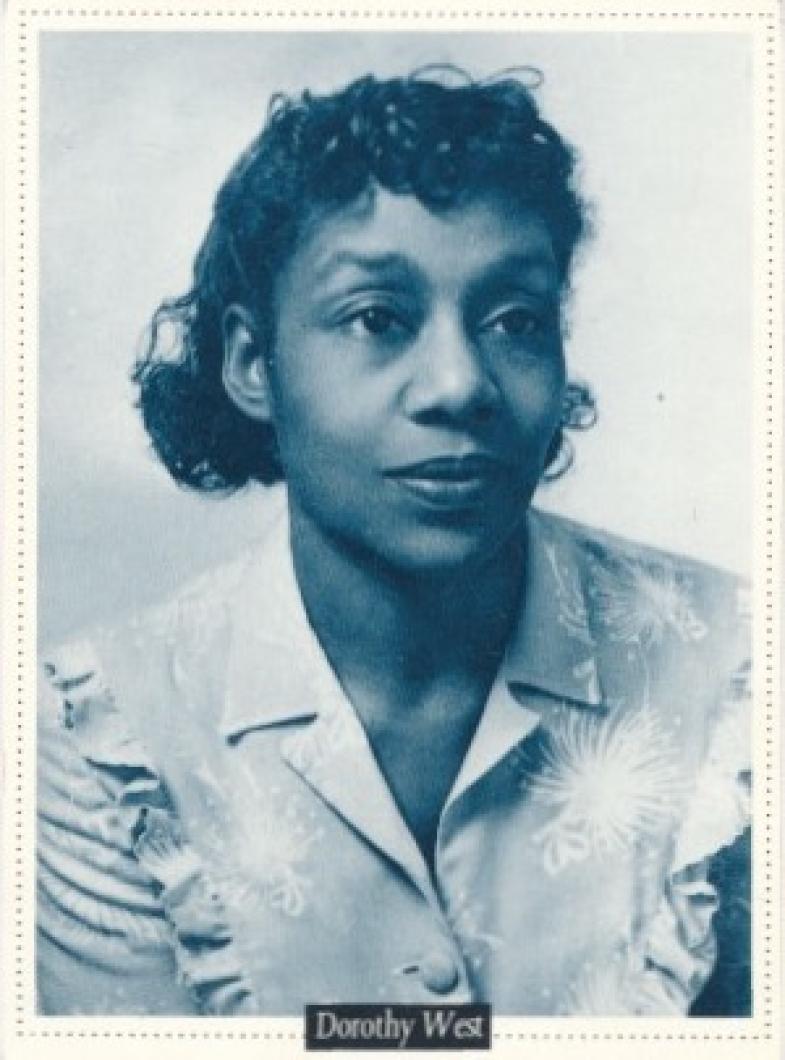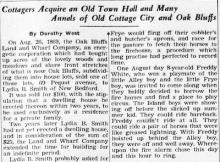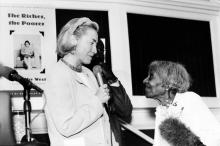Dorothy West will soon have the once in a life time thrill of seeing her first novel come out in print. The book was written at Oak Bluffs where Miss West occupies a cottage with her mother, and is to be published this spring by Houghton Mifflin. Its title, The Living Is Easy, came to her as she was describing the story to a friend of hers. At least from a first impression, the same phrase might be used to depict the personality of the author herself.
She is a youthful, vivacious and attractive young woman who has been spending summers at the Bluffs ever since early childhood. Although she has lived in Boston, New York, London and Moscow, Miss West considers the Vineyard to be her home.
“Here I have spent the greatest part of my life, and the happiest, she said. “When I was abroad and my thoughts turned homeward it was always the Island that I remembered most fondly and longed to see.”
Finds Needed Quiet and Seclusion
As she became more established in her career as a successful author, Miss West for the past few years has been passing the winter at Oak Bluffs to seek the quiet and seclusion necessary for her writing chores. In the summer when the houses in the Highlands section are occupied and the social life is at its peak, she finds it difficult to buckle down to work. But in winter where most of the cottages are shut tight and the roads and woodlands are drifted with snow, Miss West has written the novel, and the snort stories which she regularly sells to the New York Daily News syndicate.
The fact that she had written only short stories, and felt that they were her chosen medium of expression, made Dorothy West hesitate to tackle her first novel. But as she warmed to the task it grew increasingly pleasant. One thing that surprised her was the way the characters and her understanding of them matured.
The first fifty pages and an outline of the plot had been accepted by a New York publisher. When the second fifty pages differed considerably from the proposed development, the original publisher wrote that she was not following the outline and regretted that he would have to withdraw his acceptance. But Miss West, realizing that the characters she had created had a life of their own, let them take their own course.
Before long she had offers from two other publishers for the book. She was drawn to Houghton Mifflin because they are a Boston firm, and this, in addition to being the town of her birth, is also the scene in which the book is laid. In her novel, which deals with certain aspects of Negro life in that city, Miss West hopes that she has presented her characters as people rather than as stereotypes in a social drama.
Not Specifically Racial
“I believe that too many writers portray the Negro as a type, and not as an individual,” she said. “They do not see them as human beings with their own personal aspirations and experiences.” She has tried to write a story which is not specifically racial, but which integrates the racial issues in the scheme of things which affects all men.
In her brief career as a social worker in New York, Miss West learned that the problems of Negroes cannot be treated so much in the large, but must be broken down and viewed in terms of individuals rather than a class. “You will find for instance,” she sad, “that discrimination exists among the Negroes themselves, and this is one of the topics I have touched on in the novel.”
Dorothy West began writing stories at the age of 7. At 17 she won a contest and had her prize story published in the Boston Post, the first time one of her tales had appeared in print. A year later she left Boston for New York where her where her writings in Negro magazines attracted the attention of Blanche Colton Williams, who saw that she was enrolled in fiction writing courses at Columbia University.
After three years at Columbia, in 1933 she joined a group of actors and writers who were to go to the Soviet Union at the invitation of the Kremlin to make a motion picture on Negro life in America. Although Miss West was neither an actress nor a communist, the idea of the adventure appealed to her and she volunteered to make the journey and perhaps play a minor role in the contemplated movie.
At Expense of the Soviet
Although the members of the group had to pay their own passage, they were comfortably housed in the Grand Hotel in Moscow at the expense of the Soviet government. Each day the players went out to the film studios near Moscow for the usual screen tests, but the actual start of production was long delayed. The whole venture eventually bogged down in bureaucratic tape (red, naturally) and was never undertaken.
While the decision to cancel the production was being talked over in the secret chambers of the Kremlin, the group of Americans were taken on a tour of southern Russia. It was while they were in Odessa that they received word that the film would not be made. Some members of the group wanted to fight the decision, but they soon found the soviet officials usually had the last word in matters of that kind. A good many of the Americans returned home, but Miss West stayed on to play some minor parts in the Moscow studios.
She remained in Russia for eleven months and grew accustomed for one thing to stopping the traffic in the streets of the capital. It seems that 1933 was a particular bad year for Russian harvests, and a good many peasants had streamed into Moscow to escape certain starvation on the farms. They were amazed to see a Negro dressed in western clothes. “They couldn’t understand,” she said, “why I wasn’t wearing long robes or a leopard sarong.”
Once when she stopped to have her shoes shines, about 300 people crowded around her, completely blocking traffic. The police told her to move on, that she was obstructing the trolleys, or at least throwing a cog into the latest five year plan. Miss West protested that it wasn’t she who was in the way, but she left without having her shoes shined, and learned after few of these experiences to stop for such operations on more secluded thoroughfares.
Race Problem Not an Issue
Aside from the curious pedestrians, Dorothy found that the race problem in Russia virtually does not exist. “The whole country consists of many minorities,” she said, “and there is no antagonism or discrimination of one against the other.”
In the early days of her Russian visit Miss West was approached a number of times by people who wanted her to adopt the communist beliefs. But they soon let her alone, she said, when they realized they were making no headway. Her main interest in making the trip was not to see communism in action but to satisfy the great interest she had acquired in the Russians from her readings of the novels of Tolstoy and Dostoevsky. Despite their occasional propensity to stare at her, she grew to love the Russian people, but she did not admire the ideas of the Soviet government, particularly after first hand experiences with its procrastination and bureaucracy in the cancellation of the film.
The members of her party were given the very best of treatment during their visit. They were paid a liberal allowance by the government and were given “specialist” ration books which permitted them to buy more goods in the stores than the average worker.
The Moscow weather, Miss West found rather severe, extremely cold in winter and boiling hot in summer. She experienced cold ranging from a low of 24 below, and averaging about 15 below, and heat where the temperature hovered at 102. The cold, she said, was not too penetrating, because the air was very dry, but one girl in the group wept bitterly at the weary succession of frigid days. This was not because the chill brought tears to her eyes, Miss West said, but because she was frozen stiff. A redeeming feature of the Moscow winter was that the sun almost always shone, and the air was crisp and clear. Another was the Russian prescription for a cold - tea, raspberry jam and quinine.
Prompt Action by Police
One member of the international set in Moscow who attracted Miss West’s attention was an Englishman who on even the coldest days insisted on walking through the streets without his overcoat. He was warned against this erratic behavior by the Moscow police who cautioned him that he might freeze. When the Englishman persisted in sporting his springlike costume he was promptly put in the local jail. It took more than one visit to the cooler to persuade him that the Russians meant business, and that if a man in Moscow was fortunate enough to have an overcoat he should be reasonable enough to wear it.
After her return from the Soviet Union Miss West teamed up with Richard Wright in New York to edit a small magazine called the New Challenge. This venture, though run on a shoe string and not at all profitable, deepened her consciousness of Negro issues, and increased her writing skill. She continued to turn out short stories and submitted them to popular magazines. Most of them, she said, were returned, but she was encouraged to keep trying bu the increasingly complimentary tone of the rejection notes. The editors liked the stories, but they hesitated to use them because they were about Negro life. Finally she made the grade with a story which was accepted for publication in the Sunday edition of the New York Daily News. The fiction editors of that paper asked her to submit stories to be used in the daily editions, and she has continued to do so ever since.
Even before her new novel is off the press, Miss West is thinking about the next one. This time it is to be a book with Oak Bluffs as a setting, not a problem environment, she says, because the town is wonderfully free from intolerance and racial prejudice.










Comments